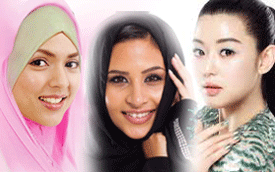Whether it is a new challenge or an emerging trend, the beauty horizon in the South Korean, the Middle Eastern, and Islamic markets looks promising, with attractive and flourishing opportunities for its players. In today’s post, we’re going to reveal some exciting findings from our ongoing research in these regions, along with a few up-and-coming trends and insights.
The Beauty Gems of South Korea
The ongoing research for our newest service—South Korean Beauty and Personal Care: Trend Spotting and Opportunity Assessment—has already revealed some interesting facts about the beauty retailing landscape in South Korea. The country’s main streets are dotted with numerous cosmetic specialty stores, such as Innisfree, Missha, It’s Skin, Etude House, Skin Food, and The Face Shop, operated by local Korean brands, most of which play at the value end of the spectrum.
Market leader AmorePacific also has its own specialty store chain, Aritaum, which sells a majority of its brands, except for Sulwhasoo and Hera, which are sold in department stores, and those brands that have their own specialty stores. As in most other places in the world, premium brands such as Chanel, Dior, and Lancôme dominate department stores, and local Korean brands dominate the mass segment. Leading department stores in South Korea include Lotte, Shinsegae, and Hyundai.
The Purity of Halal Cosmetics
Halal cosmetics and personal care products is another hot trend that garnered worldwide attention due to the new regulations that passed in Indonesia last fall and the impact these may have on all multinational cosmetics and personal care marketers.
Halal is based on the religious definition of purity and impurity. Relevant for the Halal Product Certification Bill is the purity of raw materials, production, and packaging. Preliminary findings for our upcoming Halal Beauty and Personal Care: Market Analysis and Opportunities report show that there are 11 impurities that should not be used in halal-certified products, with six of them relevant to the cosmetics and toiletries industry. These impurities include cadaver meaning every warm-blooded dead animal (but excludes Islamic-slaughtered animals), blood, pig, atheists and intoxicants, such as naturally derived ethanol, and beer. In addition, special hygienic attention and ethical production regulations must be respected to ensure the purity of the final product.
Breaking Boundaries in the Middle East
Due to factors such continuous strong economic growth coupled with a growing population, which includes a large proportion of youth adapting to modern lifestyle trends, the Middle East offers an enormous potential for beauty companies.
According to Andrea Visus from the United Kingdom’s Butterfly London who conducted extensive research on consumers in the region, 50% of them are under 30 years old and pushing the boundaries towards beauty firms, which respond with some provocative language or footage. A nice example is Mikyajy’s makeup ad by Lebanese celebrity Myriam Fares. Additionally, young people who are still living with their parents and do not worry about expenses spend a huge 10% of their average monthly salary on beauty products. The region is home to an expanding base of consumers who display a liking towards premium products and services, offering fertile ground for premium professional hair, nail, and skin care products. Kline’s soon-to-be-launched Professional Beauty in the Middle East: Market Analysis and Opportunities will be closely tracking this exciting market.
Written by Vera Sandarova, Kline’s Marketing Manager and Marcela Chifu, Kline’s Marketing Coordinator

